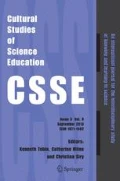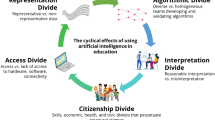Abstract
Cheating, a form of academic dishonesty, is commonly regarded as a problem in science education. This inquiry theorizes cheating not as a moral failing on the part of students or a lack of surveillance by teachers but rather as a resistance to testing. Ethnographic data from a university physical science department, analyzed with Michel Foucault’s theory of governmentality, suggests testing as a technique of disciplinary power to produce normalized cases, schooled subjects of a certain type. The resistance of cheating is an assertion of agency within inequitable power relations. As such, cheating and testing are mutually constituting. This inquiry aims to trouble the notion that testing is educationally beneficial by discussing how testing may be placing students in morally compromised positions and teachers in morally complicit positions.
Similar content being viewed by others
References
Allen, A. (2013). The examined life: On the formation of souls and schooling. American Educational Research Journal, 50(2), 216–250. https://doi.org/10.3102/0002831212466934.
Ball, S. J. (2016). Neoliberal education? confronting the slouching beast. Policy Futures in Education, 14(8), 1046–1059. https://doi.org/10.1177/1478210316664259.
Barton, A. C. (1998). Feminist science education. New York, NY: Teachers College Press.
Bazzul, J. (2012). Neoliberal ideology, global capitalism, and science education: Engaging the question of subjectivity. Cultural Studies of Science Education, 7(4), 1001–1020. https://doi.org/10.1007/s11422-012-9413-3.
Bazzul, J. (2014). Science education as a site for biopolitical engagement and the reworking of subjectivities: Theoretical considerations and possibilities for research. In L. Bencze & S. Alsop (Eds.), Activist science and technology education (pp. 37–53). Dordrecht, Netherlands: Springer.
Bazzul, J., & Carter, L. (2017). (Re)considering Foucault for science education research: Considerations of truth, power and governance. Cultural Studies of Science Education, 12(2), 435–452. https://doi.org/10.1007/s11422-016-9800-2.
Becker, H. S., Geer, B., & Hughes, E. C. (1968). Making the grade: The academic side of college life. New York, NY: Wiley.
Bencze, L., & Carter, L. (2011). Globalizing students acting for the common good. Journal of Research in Science Teaching, 48(6), 648–669. https://doi.org/10.1002/tea.20419.
Bonilla-Silva, E. (2006). Racism without racists: Color-blind racism and the persistence of racial inequality in the United States. Lanham, MD: Rowman & Littlefield.
Britzman, D. P. (1995). “The question of belief”: Writing poststructural ethnography. International Journal of Qualitative Studies in Education, 8(3), 229–238. https://doi.org/10.1080/0951839950080302.
Butler, J. (1995). Contingent foundations: Feminism and the question of ‘postmodernism.’ In S. Benhabib, J. Butler, D. Cornell, & N. Fraser (Eds.), Feminist contentions. A philosophical exchange (pp. 35–57). New York, NY: Routledge.
Butler, J. (1997). The psychic life of power: Theories in subjection. Palo Alto, CA: Stanford University Press.
Carter, L. (2008). Globalization and science education: The implications of science in the new economy. Journal of Research in Science Teaching, 45(5), 617–633. https://doi.org/10.1002/tea.20189.
Carter, L. (2014). The elephant in the room: Science education, neoliberalism and resistance. In J. Bencze & S. Alsop (Eds.), Activist science and technology education (pp. 23–36). Dordrecht, Netherlands: Springer.
Clark Blickenstaff, J. (2005). Women and science careers: Leaky pipeline or gender filter? Gender and Education, 17(4), 369–386. https://doi.org/10.1080/09540250500145072.
Davies, B. (2006). Subjectification: The relevance of Butler’s analysis for education. British Journal of Sociology of Education, 27(4), 425–438. https://doi.org/10.1080/01425690600802907.
De Lissovoy, N., & Cedillo, S. (2016). Neoliberalism and power in education. In M. A. Peters (Ed.), Encyclopedia of educational philosophy and theory. Singapore: Springer.
Dukes, D. L. (2013). “It’s not cheating if you don’t get caught”: critical discourse analysis of academic integrity policies in public high schools. (doctoral dissertation). The George Washington University. Ann Arbor, MD: ProQuest.
Foley, D. E. (1990). Learning capitalist culture: Deep in the heart of Tejas. Philadelphia, PA: University of Pennsylvania Press.
Foucault, M. (1977). Discipline and punish: The birth of the prison. London, UK: Penguin Books.
Foucault, M. (1982). The subject and power. In H. L. Dreyfus & P. Rabinow (Eds.), Michel foucault: Beyond structuralism and hermeneutics (pp. 208–226). Chicago, IL: University of Chicago Press.
Foucault, M. (1988). Technologies of the self. In M. Foucault, L. H. Martin, H. Gutman, & P. H. Hutton (Eds.), Technologies of the self: A seminar with Michel Foucault (pp. 16–49). Amherst, MA: University of Massachusetts Press.
Foucault, M. (1997). Ethics: Subjectivity and truth (P. Rabinow). (1st ed.). New York, NY: The New Press.
Green, A. M., Brand, B. R., & Glasson, G. E. (2019). Applying actor-network theory to identify factors contributing to nonpersistence of African American students in STEM majors. Science Education, 103(2), 241–263. https://doi.org/10.1002/sce.21487.
Hammersley, M., & Atkinson, P. (2007). Ethnography: Principles in practice. (3rd ed.). Hoboken, NJ: Taylor & Francis.
Haraway, D. (1988). Situated knowledges: The science question in feminism and the privilege of partial perspective. Feminist Studies, 14(3), 575–599. https://doi.org/10.2307/3178066.
Holland, D., Lachicotte, D., Skinner, D. D., & Cain, C. (1998). Identity and agency in cultural worlds. Cambridge, MA: Harvard University Press.
hooks, bell. (1994). Teaching to transgress: Education as the practice of freedom. New York, NY: Routledge.
Jackson, A. Y., & Mazzei, L. A. (2012). Thinking with theory in qualitative research: Viewing data across multiple perspectives. New York, NY: Routledge.
Johnson, A. C. (2007). Unintended consequences: How science professors discourage women of color. Science Education, 91(5), 805–821. https://doi.org/10.1002/sce.20208.
Lather, P. A. (1991). Getting smart: Feminist research and pedagogy with/in the postmodern. New York, NY: Routledge.
Link, H., Gallo, S., & Wortham, S. E. (2017). The production of schoolchildren as enlightenment subjects. American Educational Research Journal, 54(5), 835–867. https://doi.org/10.3102/0002831217706926.
Lortie, D. C. (1975). Schoolteacher; A sociological study. Chicago, IL: University of Chicago Press.
Mann, S. J. (2008). Study, power and the university: The institution and its effects on learning. London, UK: Open University Press.
Martin, A. E., Fisher-Ari, T. R., & Kavanagh, K. M. (2020). “Our schools turned into literal police states.”: Disciplinary power and novice teachers enduring a cheating scandal. Educational Studies, 56(3), 306–329. https://doi.org/10.1080/00131946.2020.1745809.
Naughton, M. (2020). Why do university students in the UK buy assignments from essay mills? Critical Education, 11(10), 1–19. https://doi.org/10.14288/ce.v11i10.186534.
Nelson, L. P., Nelson, R. K., & Tichenor, L. (2013). Understanding today’s students: Entry-level science student involvement in academic dishonesty. Journal of College Science Teaching, 42(3), 52–57. https://www.jstor.org/stable/43631795.
Nilsson, L.-E., Eklöf, A., & Ottosson, T. (2009). ‘I’m entitled to make mistakes and get corrected’: Students’ self-positioning in inquiries into academic conduct. Critical Discourse Studies, 6(2), 127–152. https://doi.org/10.1080/17405900902750088.
Ong, M., Wright, C., Espinosa, L., & Orfield, G. (2011). Inside the double bind: A synthesis of empirical research on undergraduate and graduate women of color in science, technology, engineering, and mathematics. Harvard Educational Review, 81(2), 172–209. https://doi.org/10.17763/haer.81.2.t022245n7x4752v2.
Passow, H. L., Mayhew, M. J., Finelli, C. J., Harding, T. S., & Carpenter, D. D. (2006). Factors influencing engineering students’ decisions to cheat by type of assessment. Research in Higher Education, 47(6), 643–684. https://doi.org/10.1007/s11162-006-9010-y.
Parks, R. F., Lowry, P. B., Wigand, R. T., Agarwal, N., & Williams, T. L. (2018). Why students engage in cyber-cheating through a collective movement: A case of deviance and collusion. Computers & Education, 125, 308–326. https://doi.org/10.1016/j.compedu.2018.04.003.
Popkewitz, T. S., & Brennan, M. (1998). Introduction. In T. S. Popkewitz & M. Brennan (Eds.), Foucault’s challenge: Discourse, knowledge, and power in education (pp. xiii–xvi). New York, NY: Teachers College Press.
Reinharz, S., & Davidman, L. (1992). Feminist methods in social research (Vol. viii). New York, NY: Oxford University Press.
Roth, W.-M. (2015). Schooling is the problem: A plaidoyer for its deinstitutionalization. Canadian Journal of Science, Mathematics and Technology Education, 15(3), 315–331. https://doi.org/10.1080/14926156.2015.1051672.
Roth, W.-M., & McGinn, M. K. (1998). >unDELETE science education:/lives/work/voices. Journal of Research in Science Teaching, 35(4), 399–421. https://doi.org/10.1002/(SICI)1098-2736(199804)35:4.
Rouse, J. (1996). Engaging science: How to understand its practices philosophically. Ithaca, NY: Cornell University Press.
Russell, M. L., & Russell, J. A. (2015). Black American undergraduate women at a PWI: Switching majors in STEM. Negro Educational Review, 66(1–4), 101–127.
Sanabria, T., & Penner, A. (2017). Weeded out? Gendered responses to failing calculus. Social Sciences, 6(2), 47. https://doi.org/10.3390/socsci6020047.
Seymour, E., & Hewitt, N. M. (1997). Talking about leaving: Why undergraduates leave the sciences. Boulder, CO: Westview Press.
Stanger-Hall, K. F. (2012). Multiple-choice exams: An obstacle for higher-level thinking in introductory science classes. CBE Life Sciences Education, 11(3), 294–306. https://doi.org/10.1187/cbe.11-11-0100.
Stiles, B. L., Wong, N. C. W., & LaBeff, E. E. (2018). College cheating thirty years later: The role of academic entitlement. Deviant Behavior, 39(7), 823–834. https://doi.org/10.1080/01639625.2017.1335520.
St Pierre, E., & Pillow, W. (2002). Inquiry among the ruins. In E. St Pierre & W. Pillow (Eds.), Working the ruins: Feminist poststructural theory and methods in education (pp. 1–24). New York, NY: Routledge.
Thompson, G., & Cook, I. (2014). Manipulating the data: Teaching and NAPLAN in the control society. Discourse: Studies in the Cultural Politics of Education, 35(1), 129–142. https://doi.org/10.1080/01596306.2012.739472.
Valenzuela, Y. (2006). Mi fuerza/my strength: The academic and personal experiences of Chicana/Latina transfer students in math and science (Unpublished doctoral dissertation). University of California, Irvine.
Villenas, S. (2002). This ethnography called my back: Writings of the exotic gaze, “othering” Latina, and recuperating Xicanisma. In E. St Pierre & W. Pillow (Eds.), Working the ruins: Feminist poststructural theory and methods in education (pp. 74–95). New York, NY: Routledge.
Witteveen, D., & Attewell, P. (2020). The STEM grading penalty: An alternative to the “leaky pipeline” hypothesis. Science Education, 104(4), 714–735. https://doi.org/10.1002/sce.21580.
Wong, S., Yang, L., Riecke, B., Cramer, E., & Neustaedter, C. (2017). Assessing the usability of smartwatches for academic cheating during exams. In Proceedings of the 19th International Conference on Human-Computer Interaction with Mobile Devices and Services, 31. New York, NY: ACM. https://doi.org/10.1145/3098279.3098568.
Zheng, R. (2018). Precarity is a feminist issue: Gender and contingent labor in the academy. Hypatia, 33(2), 235–255. https://doi.org/10.1111/hypa.12401.
Author information
Authors and Affiliations
Corresponding author
Additional information
Publisher's Note
Springer Nature remains neutral with regard to jurisdictional claims in published maps and institutional affiliations.
Lead editor: Lily Taylor.
Rights and permissions
About this article
Cite this article
Doerr, K. Testing and cheating: technologies of power and resistance. Cult Stud of Sci Educ 16, 1315–1334 (2021). https://doi.org/10.1007/s11422-021-10048-6
Received:
Accepted:
Published:
Issue Date:
DOI: https://doi.org/10.1007/s11422-021-10048-6




